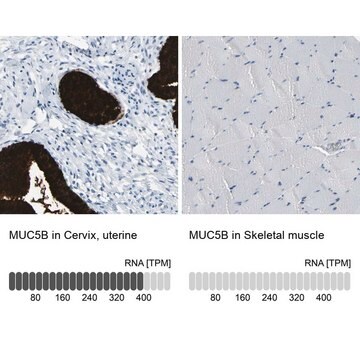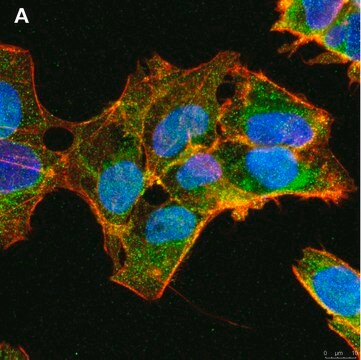MABE342
Anti-Puromycin Antibody, clone 4G11
clone 4G11, from mouse
About This Item
Productos recomendados
biological source
mouse
Quality Level
antibody form
purified immunoglobulin
antibody product type
primary antibodies
clone
4G11, monoclonal
species reactivity
human
species reactivity (predicted by homology)
all
technique(s)
flow cytometry: suitable
immunocytochemistry: suitable
immunofluorescence: suitable
western blot: suitable
isotype
IgG1κ
shipped in
wet ice
target post-translational modification
unmodified
Gene Information
human ... NPEPPS(9520)
General description
Specificity
Application
Western Blotting Analysis: A representative lot from an independent laboratory detected Puromycin-incorporated neosynthesized proteins in WB (David, A., et al. (2012). J Cell Biol. 197(1):45-57.; Schmidt, E., K., et al. (2009). Nat Methods. 6(4):275-277.).
Immunofluorescence Analysis: A representative lot from an independent laboratory detected Puromycin-incorporated neosynthesized proteins in IF (David, A., et al. (2012). J Cell Biol. 197(1):45-57.; Schmidt, E., K., et al. (2009). Nat Methods. 6(4):275-277.).
Fluorescence Activated Cell Sorting Analysis: A representative lot from an independent laboratory detected Puromycin-incorporated neosynthesized proteins in FACS (David, A., et al. (2012). J Cell Biol. 197(1):45-57.; Schmidt, E., K., et al. (2009). Nat Methods. 6(4):275-277.).
Alexa Fluor™ is a registered trademark of Life Technologies.
Quality
Western Blotting Analysis: A 1:12,500 dilution of this antibody detected Puromycin-incorporated neosynthesized proteins in HEK293 cell lysates treated with Puromycin only. This antibody also detected small mounts of puromycin in HEK293 cells treated with Puromycin and Cyclohexamide.
Target description
Physical form
Legal Information
¿No encuentra el producto adecuado?
Pruebe nuestro Herramienta de selección de productos.
Optional
Storage Class
12 - Non Combustible Liquids
wgk_germany
WGK 1
flash_point_f
Not applicable
flash_point_c
Not applicable
Certificados de análisis (COA)
Busque Certificados de análisis (COA) introduciendo el número de lote del producto. Los números de lote se encuentran en la etiqueta del producto después de las palabras «Lot» o «Batch»
¿Ya tiene este producto?
Encuentre la documentación para los productos que ha comprado recientemente en la Biblioteca de documentos.
Nuestro equipo de científicos tiene experiencia en todas las áreas de investigación: Ciencias de la vida, Ciencia de los materiales, Síntesis química, Cromatografía, Analítica y muchas otras.
Póngase en contacto con el Servicio técnico








